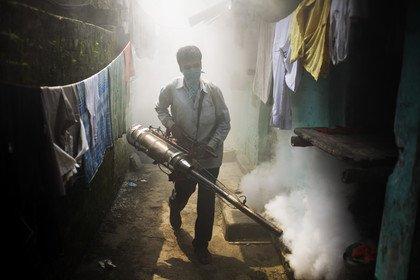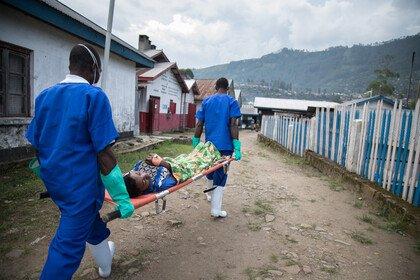
New digital tools use climate data to better predict and prepare for infectious diseases outbreaks
Wellcome announces £22.7 million for new cutting-edge digital tools to help transform preparations and responses to outbreaks of devastating diseases.
The climate crisis is a health emergency which is threatening the lives and wellbeing of communities around the world in many ways – including the spread of infectious diseases.
Wellcome is supporting global research to advance solutions to address these urgent health threats, with funding for 24 research teams in 12 countries around the world to develop innovative digital tools to model the relationship between climate change and infectious disease.
The £22.7 million funding will allow these projects to address critical gaps in understanding about where and when deadly disease outbreaks are likely to occur, helping policy-makers to plan ahead, prepare healthcare systems and increase treatment accessibility and resources, and respond rapidly with targeted and efficient public health measures, saving more lives.
Some of the funded projects include:
- CholOut-EWS – developing software to model and forecast the risk of cholera outbreaks in Bangladesh and communicate these through a user-friendly early warning system for researchers and policy-makers.
- E-DENGUE – the first ever randomised control trial to evaluate the effectiveness of a climate-driven early warning systems for climate-sensitive infectious diseases, including cost-effectiveness. The team will use dengue in Vietnam as a case study to develop one such system with a user-friendly interface aimed at local health practitioners to predict dengue incidence and outbreaks for early action.
- Mosqlimate – improving the Brazilian early warning system for infectious disease outbreaks, ‘Infodengue’, by integrating climate change data into the system to estimate how changes to climate and land use will affect disease transmission.
- IDExtremes – an open-source modelling tool to predict the probability of infectious disease outbreaks given compound extreme climatic events. The tool will be integrated into existing climate services, disease surveillance and humanitarian action platforms for decision-makers in Latin America, Asia and Africa.
As global temperatures continue to warm, more places are becoming suitable habitats for disease-carrying mosquitoes. Increases in extreme weather events like storms and floods can also contaminate water supplies and disrupt access to safe sanitation, causing the spread of life-threatening infections.
Last year in Pakistan record monsoon rains resulted in a devastating outbreak of dengue, and in Nigeria flooding accelerated the spread of cholera.
Action is needed now to address the risk of further escalation, including in areas where these diseases have never been reported before. By 2050, it is predicted that disease-carrying mosquitoes will reach up to 500 million more people than they do today. It is predicted that more than 1 billion people will be newly at risk of dengue, zika, chikungunya and many other diseases by 2080.
Felipe Colón, Technology Lead at Wellcome, said: “The connection between climate change and the spread of infectious disease is often overlooked, or not made at all. This has resulted in a critical shortage of tools that model the relationship between climate change and disease outbreaks, and those that do exist are often complex and not accessible for local health official and policy-makers. Without these, decision-makers are in danger of finding themselves unprepared, leaving communities unprotected in the face of increasing disease outbreaks, risking the lives of millions.
“Wellcome is committed to addressing the urgent global health threats of both the climate crisis and of escalating infectious disease. As part of this, we are proud to be supporting 24 global project teams to design and deliver innovative digital tools that can help predict where and when outbreaks might occur, and provide early warnings to enable preparations and mitigation measures to be put in place, leading to real-world benefits for the most vulnerable communities.”
This funding follows a Wellcome-commissioned study, published last year, which found only 37 fully developed tools for climate-sensitive infectious disease (CSID) modelling. Most were created in North America and Europe, highlighting the need for greater global representation.
The new tools will collect and integrate climate data into models of infectious diseases, allowing researchers to visualise the impact climate change might have on spread and transmission. Some will generate warning alerts of potential outbreaks ahead of time or the emergence of diseases not previously seen in their local areas, which could help decision-makers allocate resources more effectively to better protect current and future generations from some of the worst health impacts of climate change.
Dr Dung Phung, from The University of Queensland, and lead researcher on the E-DENGUE project, said: “Our project will develop a simple, accessible digital prediction tool for dengue prevention in Vietnam. But we will not stop there, we will also assess the effectiveness of using this tool, and what is needed to integrate it into the routine surveillance system currently used in the country. This will support the local health departments and communities to proactively plan and deploy preventive and control measures in high-risk areas. Our hope is that this tool will also be able to be used for other vulnerable population in South-East Asia, and similar areas around the world.”
Prof Rachel Lowe, from the Barcelona Supercomputing Center, and lead researcher on the IDExtremes project, said: “Infectious disease prediction doesn’t currently take into account the sizeable impact of climate change and climate variability on their transmission risk. In order to accurately and effectively predict and protect against infectious diseases, climate and infectious disease data must be combined. This funding will allow us to work with climate service providers, disease surveillance teams and humanitarian agencies, to create an open-source software package to predict the probability of infectious disease outbreaks several months in advance, which could help guide the implementation of control measures more effectively.
“Users will be able to input both observed and forecast climate data, such as drought and flood indicators, and measure their interaction with the urban landscape and socio-economic conditions. We will ensure these tools are easy to use and sustainable, even in low-resource or limited IT capacity settings for local agencies, and can be integrated into existing platforms.”
The tools will be developed during the early part of the five-year projects, with later years being used for implementation and evaluation within communities.
While these projects will be focused in specific areas, with different geographies presenting different challenges for disease modelling, the fundamentals of these systems and tools should be transferable across the world. Therefore, part of this funding will also include work to strengthen the ‘community of practice’ for climate-sensitive disease modelling to ensure these tools can be successful in the long term.
The software will be open source, allowing researchers and policymakers all around the world to benefit from the tools and support preparations to limit the disastrous impact of climate-related diseases in future.
Wellcome, a leading global funder of science to advance human health and wellbeing, has committed £16 billion over the coming decade to support scientific discovery and solutions to tackle the three most urgent health threats of our time - climate and health, infectious disease and mental health.
This week, Wellcome also launched their Climate Impact Awards – a new funding scheme aiming to make the health effects of climate change visible across both physical and mental health.
